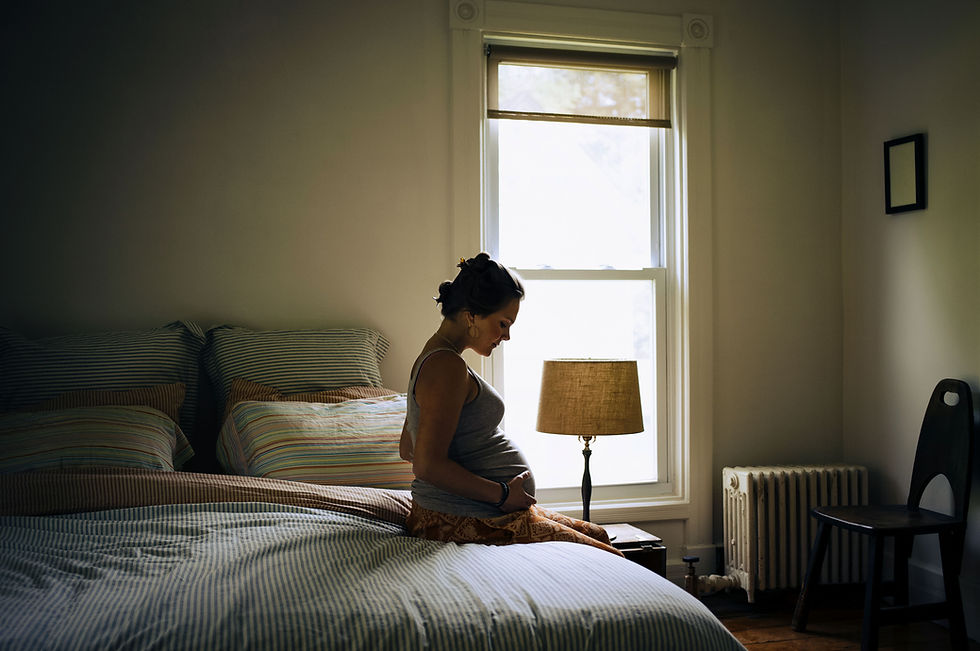Maternal Mental Health
- Camila Caster
- Mar 4
- 3 min read
Updated: Mar 25
IT'S IMPORTANT!
Mental health conditions are the most common complication of pregnancy and childbirth, affecting at least 1 in 5 mothers or childbearing people (800,000 families) each year in the United States. Sadly, 75% of women experiencing these maternal mental health conditions do not get the care need for recovery.

The good news is that with proper awareness, depression and anxiety in pregnancy are treatable. It is important to recognize symptoms in yourself, so you can get the help you need. Don't be ashamed, you are not alone! There are many kinds of mental health problems that can affect you with pregnancy.
You may have heard of the BABY BLUES. This usually refers to the period after the birth of a child. Up to 85% of childbearing individuals experience postpartum depression. This typically include emotional sensitivity, weepiness, and / or feeling overwhelmed. This feeling can be magnified when a stillbirth occurs. It is completely normal to feel this way!
Other mental health problems can occur during pregnancy. DEPRESSION affects about 14% of childbearing individuals. Symptoms of depression during pregnancy can include change in appetite, sleep, energy, motivation, and concentration. Negative thinking including guilt, helplessness, hopelessness, worthlessness. Irritable, angry, rageful. Lack of interest in the baby. Low self‐care. Intrusive or scary thoughts; thoughts of harming self or baby. Please seek help right away if you find yourself feeling like this. This is particularly common in pregnancies after loss.
POST TRAMAUTIC STRESS DISORDERS can also occur, especially in pregnancies who have had previous trauma with other pregnancies. About 9% of childbearing individuals can experience PTSD. You can experience change in cognition and mood associated with traumatic events, typically around childbirth. Avoidance of stimuli associated with the traumatic event. Feeling constantly keyed up or on guard. This is also normal in a pregnancy after loss, but if you find that these feelings are taking over your day-to-day life and preventing you from enjoying pregnancy, please speak to your provider ASAP.
6-8% of childbearing individuals can experience ANXIETY during pregnancy. Of course, as with anything else this feeling will intensify in a pregnancy after loss. You may experience feeling easily stressed, worried, overwhelmed, and tense. Panic attacks, including shortness of breath, rapid pulse, dizziness, chest or stomach pain can be common. Some may have a fear of going crazy or dying. Intrusive or scary thoughts; thoughts of harming self or baby. Fear of going outside. Sleep disturbances; difficulty falling or staying asleep, even if baby is sleeping. Many of these symptoms can be combined with other mental health related issues and they can be hard to combat on your own. Always know that there is nothing wrong with asking for help!
It is really IMPORTANT for you to find help if you find yourself in this situation. The NIH says that "Efforts to prevent and treat these disorders may reduce the scale of stillbirth/infant deaths" when speaking about stillbirth and depression/anxiety during pregnancy. Let's help them reach this goal together!
RESOURCES
The Maternal and Child Health Bureau (MCHB) strengthens public health systems to meet the needs of America’s mothers, children, and their families. They reach about 59 million pregnant mothers, infants, and children, including children with special health care needs.

Maternal Mental Health Leadership Alliance (MMHLA) is a nonpartisan 501(c)3 nonprofit organization dedicated to improving the mental health of mothers and childbearing people in the United States with a focus on national policy and health equity. They have great resources for anyone dealing with mental health and pregnancy.
READY TO LEARN MORE? There's plenty more #empoweredpregnancy goodness where that came from! Head back to the Empowered Pregnancy Overview to for even more empowerment. #UnitedWePush

